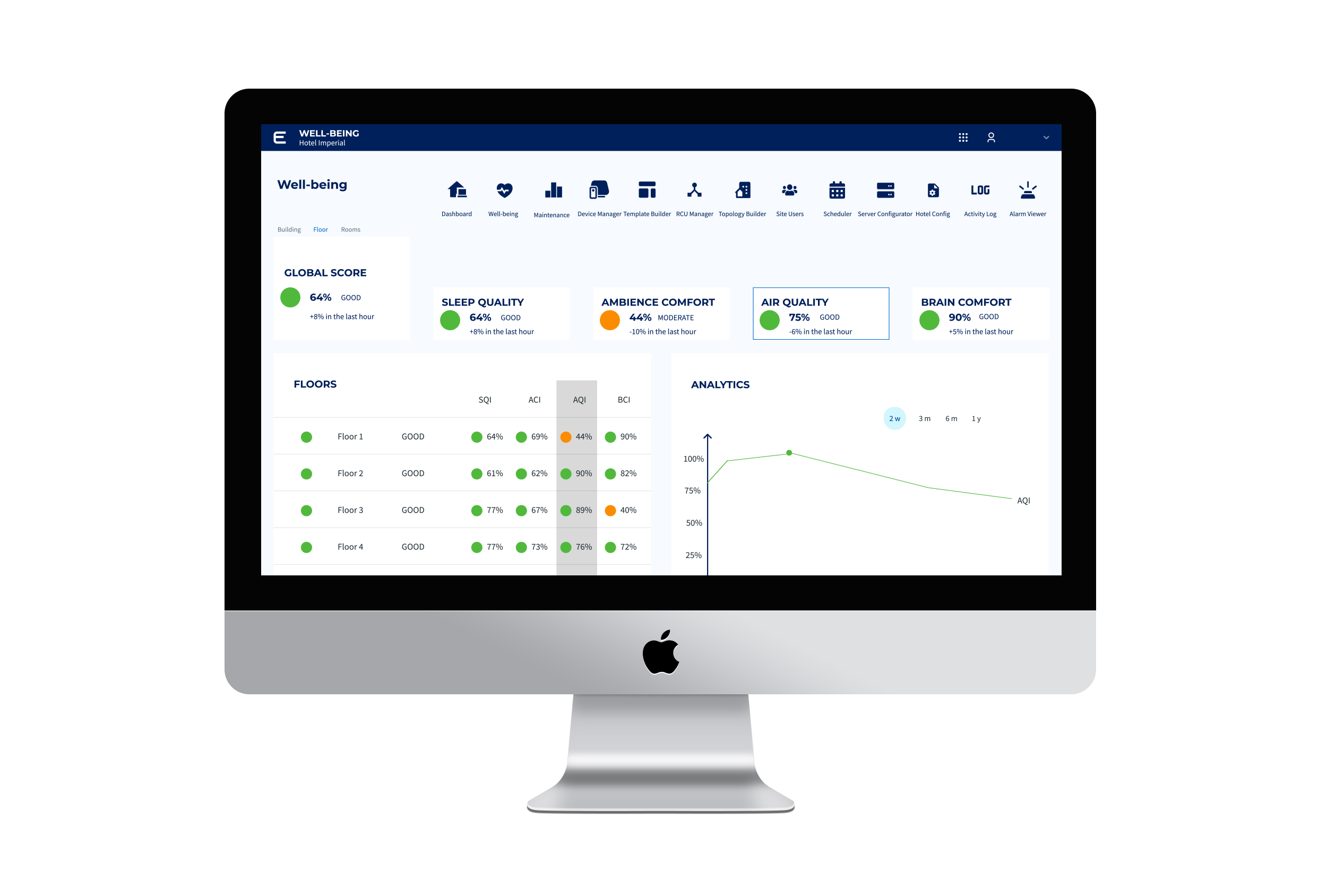Monitor Your Room's Air Quality with Etheos: Ensuring Guest Comfort with Real-Time Measurements
Etheos Transforms Guest Experiences into Measurable, Scientifically Supported KPIs
Etheos platform – the guest room management system of VDA Telkonet – generates scientifically supported KPIs that translate guest experiences into measurable and comparable data. Indoor Air quality (IAQ) is a crucial factor that can impact guest experience and overall health during their stay at hotels. The importance of air quality grew significantly in response to COVID. As a result, hotels are beginning to implement air quality sensors to ensure a healthy and comfortable environment for their guests. These sensors not only monitor and maintain air quality but also contribute to the safety and well-being of both guests and staff. These sensors can collect data on humidity, light, VOCs (Volatile Organic Compounds), carbon dioxide (Co2) levels, and more.

Revolutionize Guest Experiences: Italy's First AI-Powered Hotel Automation Project
In Italy, the inaugural pilot project combining Artificial Intelligence, Neuroscience, and hotel Automation systems has been launched. This collaboration between VDA Telkonet and Strobilo employs cutting-edge techniques to investigate the interaction between humans and the environment, aiming to quantify and make the guest experience measurable. Their joint effort aspires to transform the hospitality industry and redefine the future of guest experiences.
Here are five benefits of having air quality sensors in hotels.
- Enhancing Indoor Air Quality
Air quality sensors play a significant role in detecting and measuring various pollutants such as VOCs, carbon dioxide (Co2), particulate matter (PM), and humidity. By continuously monitoring these parameters, hotels can ensure that the air inside their premises is clean, fresh, and free from harmful substances. This is particularly important in urban areas where pollution levels can be high, and ventilation may not always be adequate.
- Health and Comfort of Guests
Sometimes guests are unaware that their guest room is stuffy. A poor night’s sleep may have more to do with poor air quality than the comfort of the mattress. Poor air quality can lead to discomfort, allergies, and respiratory issues for guests. For business travelers who work in their hotel rooms, high C02 levels can lead to headaches and difficulty concentrating. By installing air quality sensors, hotels can identify any issues promptly and take necessary actions to improve the air quality. This could include adjusting room temperature, increasing ventilation, or implementing air purifiers. By providing a healthy and comfortable environment, hotels can enhance guest satisfaction and loyalty. - Safety and Well-being
Air quality sensors monitor pollutants and detect potentially dangerous gases such as carbon monoxide. Carbon monoxide, the colorless, odorless gas that can be emitted from faulty heating systems or appliances, poses a serious risk to occupants’ health and safety. By integrating air quality sensors, hotels can detect any leaks and take immediate action to prevent any harm.
- Energy Efficiency
Air quality sensors can also contribute to energy efficiency in hotels. By continuously monitoring air quality parameters, hotels can optimize their HVAC systems and ventilation rates. This ensures that energy is not wasted by unnecessarily running systems at full capacity when air quality is already at an acceptable level. By reducing energy consumption, hotels can lower their operational costs and contribute to environmental sustainability. - Reputation and Guest Perception
Increasingly, hotels are buying in to the ESG model (Environmental, Social, and Governance). These hotels prioritize air quality and guest comfort by implementing air quality sensors demonstrate their commitment to providing a safe and healthy environment. This can significantly enhance their reputation and guest perception. Health and safety have become high priorities for travellers and having air quality (IAQ) sensors in place can be a powerful marketing tool. It can attract health-conscious guests and differentiate a hotel from its competitors.
